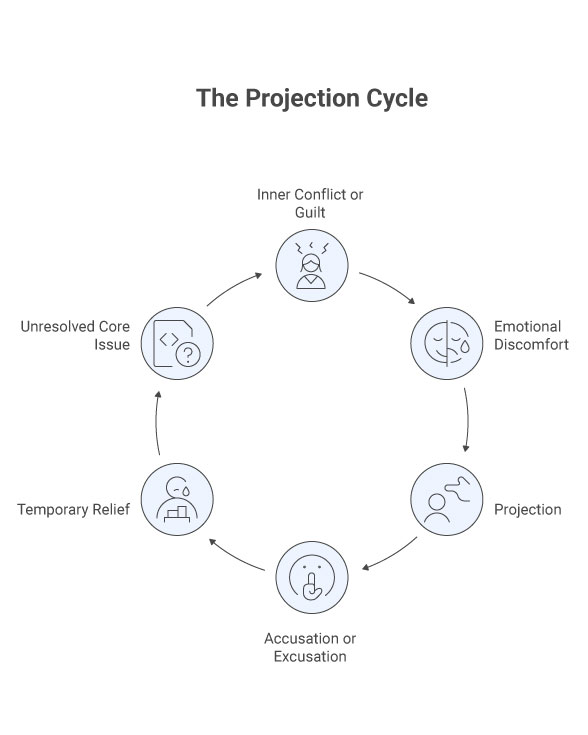Physical Address
304 North Cardinal St.
Dorchester Center, MA 02124
Physical Address
304 North Cardinal St.
Dorchester Center, MA 02124
Discover Your Purpose
Discover Your Purpose

In human interactions, conflicts often arise not from truth, but from the unconscious need to avoid responsibility. At times, what seems like an accusation—a statement of blame—may actually mask an excusation—a psychological defense mechanism used to escape emotional accountability. In many relationships, when accusations hide excuses, it reveals a deeper struggle with emotional projection and avoidance. Understanding this difference is crucial to maintaining emotional integrity, healthy boundaries, and genuine connection in our relationships.
An excusation occurs when someone projects their inner conflicts outward, using accusations to deflect personal guilt, shame, or insecurity. Rather than facing uncomfortable truths, they turn the emotional spotlight on others.
This process allows the accuser to temporarily ex-clude themselves from responsibility. The resemblance between “accusation” and “excusation” isn’t just linguistic—it reveals a psychological truth: many accusations are self-protective stories built to avoid internal discomfort.
Recognizing when a person’s anger is genuine versus when it’s defensive can save you emotional energy and prevent unnecessary guilt. Look for these indicators:
At the core of most excusations lies projection—a defense mechanism where individuals attribute their unwanted emotions to others.
For example, someone feeling guilty for neglecting a relationship may accuse you of being distant. By doing so, they avoid facing their own emotional avoidance and create a false sense of control through blame.
This cycle often perpetuates emotional toxicity, where accountability is externalized, and genuine healing becomes impossible.
People resort to excusations not because they’re malicious, but because facing personal pain can be deeply uncomfortable. Reasons include:

When faced with unfair accusations or emotional projection, it’s important to differentiate between responsibility and guilt.
Once you’ve offered a sincere apology and taken reasonable responsibility, your emotional work is done. The rest lies with the person holding the grudge. Continuing to absorb misplaced blame only enables emotional dysfunction.
Sometimes, despite your best efforts, forgiveness doesn’t come. The other person remains angry—not because of your actions, but because they’re avoiding their own pain.
In such cases, detachment is not cruelty; it’s self-respect. You cannot heal someone else’s emotional wounds by sacrificing your peace.
Letting go doesn’t mean you don’t care—it means you choose clarity over chaos.
How to Avoid Legal Problems: A Guide for Everyone
| Situation | Emotional Response | Best Reaction |
|---|---|---|
| They accuse you of hurting them, but refuse forgiveness | Emotional projection | Stay calm, acknowledge once, and disengage |
| They repeat old grievances without solution | Unresolved self-conflict | Set boundaries and limit emotional exposure |
| They twist facts to fit their narrative | Defensiveness | Clarify with empathy, but avoid debate |
| They play the victim in every conflict | Emotional immaturity | Show compassion, but prioritize your well-being |
Integrity means staying centered even when falsely accused. Responding to excusations with calmness and compassion exposes their emptiness. The best defense is emotional clarity—knowing your truth and acting with honesty.
When we no longer feel the need to prove our innocence, we regain power. We begin to see accusations for what they are: reflections of another person’s unresolved story.

We grow emotionally not by avoiding discomfort, but by embracing it with honesty. Emotional responsibility involves:

When accusations are truly excusations, they reveal more about the accuser than the accused. Understanding this dynamic helps us navigate human relationships with strength, compassion, and emotional intelligence.
We are not responsible for healing others’ projections—but we are responsible for staying honest, humble, and self-aware.
By seeing through compromised integrity and refusing to carry false blame, we protect our peace—and invite others to do the same.